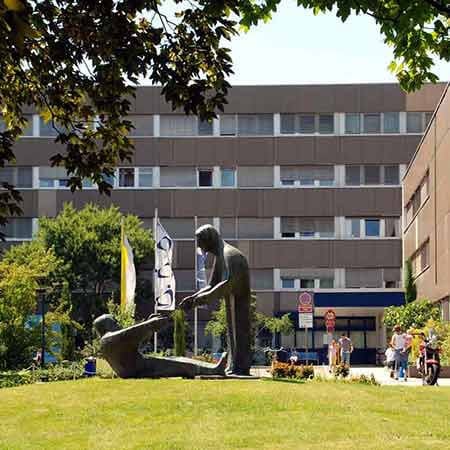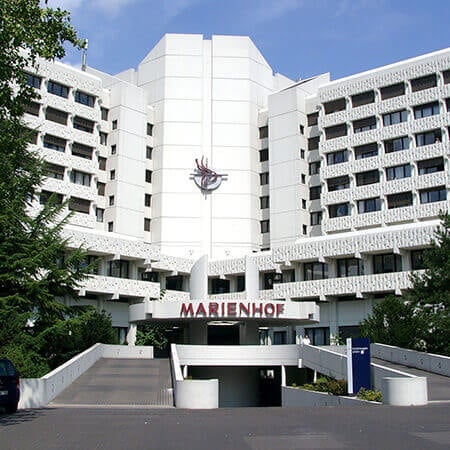Laryngeal cancer
Laryngeal cancer is a malignant tumour which is formed from the epithelial tissue of the corresponding organ. It is a widespread tumor which accounts for 1.5-3% of all cancer cases in different countries. If detected at an early stage, the disease has a favourable prognosis. However, laryngeal cancer is usually detected only at 3 or 4 stages which reduces the survival rates.
The Booking Health portal presents 86 German clinics specializing in laryngeal cancer treatment
Show all clinics
Laryngeal cancer – Diagnostics
The diagnosis of laryngeal cancer includes two basic steps. The first is the detection of the tumor-like formation, while the second one is aimed at the determination of the histological type of the tumour.
The following techniques help to identify a tumor:
- Ultrasound examination
- Indirect hypopharyngoscopy and laryngoscopy
After that fiberoptic laryngoscopy and a needle biopsy of the tumour are performed. A biopsy sample is sent to histological examination that helps to identify the type of the malformation.
Laryngeal cancer can only be diagnosed after a histological examination. This diagnosis has both high sensitivity and specificity (in good European hospitals it reaches 100%).
To assess the extensiveness of the tumorous process and plan a treatment strategy, doctors use the following diagnostic methods:
- CT
- MRI
- Chest X-ray
- Bronchoscopy
- Esophagoscopy
The hospitals of Germany and other developed countries use positron emission tomography, which involves the introduction of radioactive sugar (fluorodeoxyglucose) into the patient’s body. The tumour cells accumulate it and thus are highlighted. This technique helps not only to detect laryngeal cancer, but also to reveal its metastases.
Best clinics for the laryngeal cancer diagnostics in Germany:
Laryngeal cancer – Treatment
The main treatment methods are surgery and radiation therapy. The surgery is necessary during stages 3 and 4 (if the tumour is resectable and there are no contraindications). Sometimes radiation is enough at stages 1 and 2 . Therefore, 85-95% of patients are completely cured with the preservation of the organ and its function.
One more option is laser treatment. It can be effective during the initial stages (stages 0 and 1). This kind of treatment is endoscopic (without any skin incisions). There can be a tumour recurrence after radiation or laser therapy. In this case, laryngeal cancer requires surgical treatment.
During stage 3, or at some earlier stages, sole radiation therapy may not be enough. Therefore, a tumour resection or a partial resection of the larynx is performed. In some situations, it is necessary to remove the organ totally, as well as a part of the larynx or other adjacent structures.
An oncologist determines the feasibility and scope of surgery on the basis of a specific clinical situation and assessment of all risks and advantages.
Chemotherapy is an additional treatment method. It is used in the following cases:
- As an addition to radiation therapy in order to increase its efficiency
- After the surgery in order to reduce the risk of recurrence
- In the case of inoperable laryngeal cancer in order to improve patient’s quality of life
If chemotherapy failed to be efficient, the treatment can be completed by immunotherapy. European hospitals use drugs which allow a human immunity to attack the tumour more intensively.
The costs for the treatment in the specialized cancer centers in Germany are as follows:
- The cost of the treatment of laryngeal cancer with laser resection is between 16,700 EUR and 28,500 EUR.
- The cost of the treatment of laryngeal cancer with extensive resection and tracheostomy is between 18,900 EUR and 32,400 EUR.
- The cost of the treatment of laryngeal cancer with radiotherapy is between 14,000 EUR and 31,100 EUR.
Laryngeal cancer – Innovative treatment
New treatment methods for laryngeal cancer are constantly being developed. The surgical techniques are improved, while new methods of radiation and drug therapy also appear.
- Transoral robotic surgery. The surgery is performed by a robot that is remotely guided by a surgeon. Thus, efficiency and accuracy of incisions are increased, while intraoperative mortality and a risk of complications are reduced. Robotic surgery also shortens the period of rehabilitation.
- Proton beam therapy. This kind of treatment is available only in the best hospitals of Germany, Switzerland and other economically developed countries. German doctors have an opportunity to use not X-rays, but proton beams to destroy the tumours. The advantages of such therapy include a higher accuracy and minimal damage to the surrounding tissues, while a disadvantage is the high cost, because this treatment requires expensive equipment.
- EGFR inhibitors. Laryngeal squamous cell carcinoma contains an abnormally high amount of epidermal growth factor receptors on its surface. Special drugs have already been developed, which are aimed at such cells destruction. Erbitux is a drug used in the European hospitals to treat laryngeal cancer.
- Angiogenesis inhibitors. A growing tumour requires a large number of nutrients and oxygen. Therefore, there are a lot of blood vessels which are formed near it. The tumour releases chemicals that force the body to grow new arteries and ensure its nutrition. The new drugs have already been developed which block these substances and prevent the growth of new blood vessels that feed the tumour. Avastin and Sutent are drugs, which are used to treat laryngeal cancer.
- Photodynamic therapy. Effectiveness of this therapy for the treatment of laryngeal cancer at an early stage is under investigation. A specific substance is injected into the body, which accumulates in cancer cells and makes them sensitive to light of a certain wavelength. Then such light is used to destroy the tumour. Upon successful completion of the clinical testing, photodynamic therapy will be used in the European hospitals to treat laryngeal cancer.
Treatment of stage 4 laryngeal cancer
Stage 4 laryngeal cancer can sometimes be treated with surgery. These are technically complex operations, so it is better to contact specialized centers in developed countries. It is usually necessary to remove the entire larynx, nearby organs (for example, the thyroid gland), and several levels of lymph nodes. After surgery, treatment for stage 4 cancer is supplemented with radiation therapy and chemotherapy.
Treatment of stage 4 laryngeal cancer without distant metastases in inoperable patients begins with chemoradiotherapy. The tumor may then become resectable, in which case it will be removed.
Systemic therapy is mainly used in the treatment of stage 4 laryngeal cancer with distant metastases. It can be supplemented by local procedures that are palliative in nature. The treatment of end-stage cancer may include chemotherapy, targeted therapy with EGFR inhibitors, and immunotherapy with PD-1 inhibitors.
Best clinics for the laryngeal cancer treatment in Germany:


Laryngeal cancer – Rehabilitation
Most patients require rehabilitation after the treatment of complex oncological diseases. It includes the following aspects:
- Prevention of complications that may occur as a result of treatment. It can be pneumonia, lymphostasis, thromboembolic or infectious complications.
- Restoration of general health. The elimination of the consequences after surgeries and chemotherapy is carried out. The functions of internal organs are restored with the help of various medical and rehabilitation measures.
- Restoration of occupation. A person must not just stay alive. He must have physical and intellectual capabilities, which are sufficient for employment.
- Psychological support. First of all, it is required for patients, whose occupational performance was harmed because of the disease. Patients with deterioration of appearance also will benefit from psychological help.
- Restoration of appearance. If necessary, you can use surgical and other methods in Germany to restore appearance defects caused by cancer. For example, to carry out the reconstruction of the breast.
In German clinics, rehabilitation is carried out in a comprehensive manner. The patients are provided with qualitative care here. Doctors' monitoring and conservative treatment allow to avoid complications, which usually happen after treatment of oncological diseases. Psychotherapy, physiotherapy and physical therapy are actively used in Germany.
Specialists in different medical spheres take part in the rehabilitation process. These are massage therapists, speech therapists, specialists in physiotherapy exercises, physiotherapists. Social and occupational therapy is carried out, as well. If necessary, people are taught how to eat properly, take care of the postoperative scar, etc.
In Germany, rehabilitation is carried out with the maximum level of comfort for the patient. A person feels the results quite quickly and it improves his motivation and promotes further recovery.
Best clinics for oncological rehabilitation in Germany:
Author:
The article was edited by medical expert, board certified Dr. Nadezhda Ivanisova. For the treatment of the conditions referred to in the article you must consult a doctor; the information in the article is not intended for self-medication!
Source:
The cost of services includes
Here you can find the cost of treatment for this disease at the German University Hospitals. Leave a request and we will provide a free consultation with a doctor and will start organizing the whole treatment process.
The program includes the following:
- Issuing of an invitation for getting a visa for treatment as quick as possible
- Fixing an appointment at a time convenient for you
- Preliminary organization of a comprehensive examination and discussion of the forthcoming treatment plan
- Arranging transfer from the airport to the hospital and back to the airport
- Provision of interpreting services and services of a personal medical coordinator
- If necessary, assistance in the organization of further surgical treatment
- Provision of a medical insurance against treatment complications covering up to 200,000 euro
- Preparation and translation of medical records and recommendations from the hospital
- Assistance in the subsequent communication with your attending physician, including consultations on repeated X-ray images through the unique medical document management system E-doc




